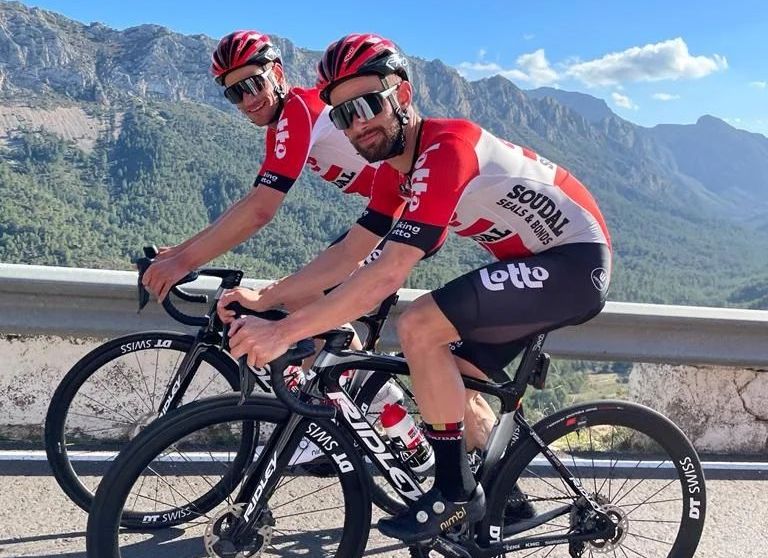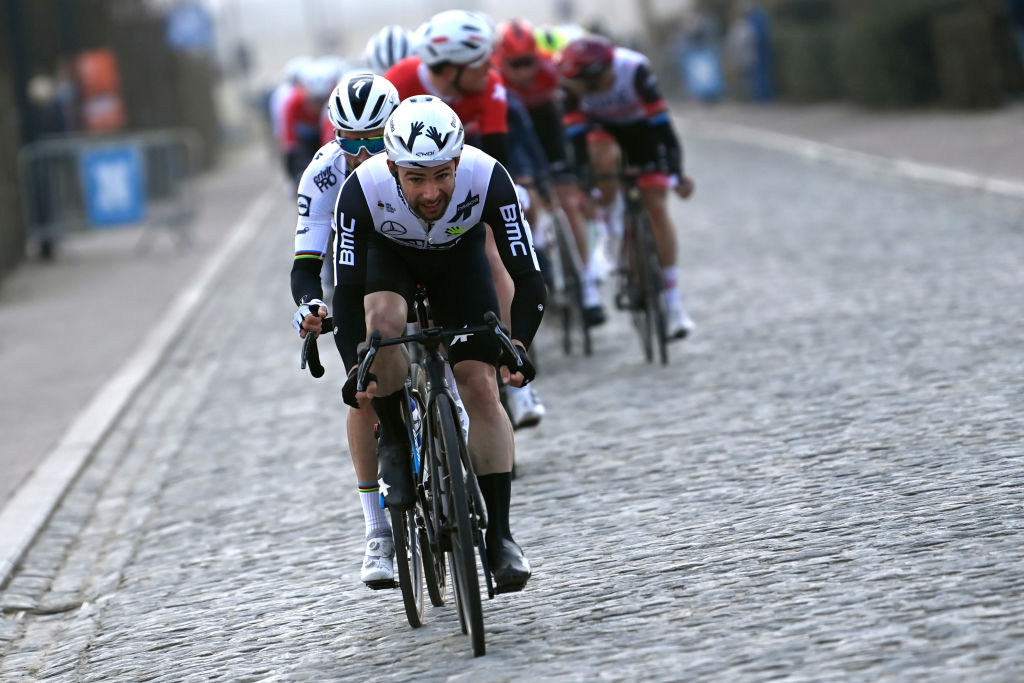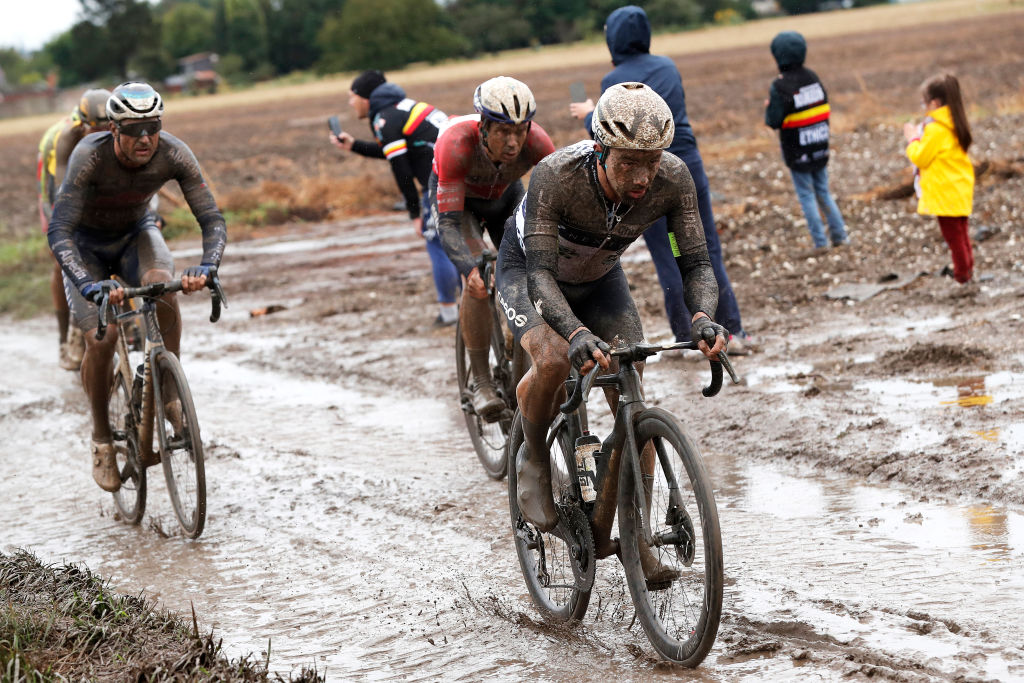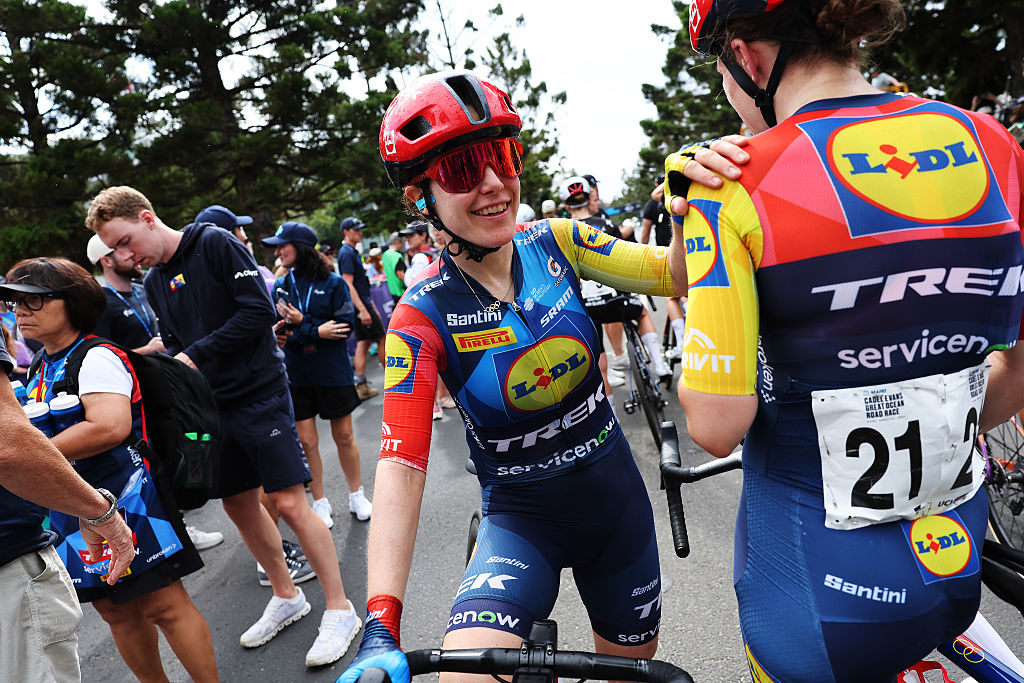The transformation of Victor Campenaerts
Belgian tells us how he has reinvented himself as a Classics rider and has fallen in love with cycling again

The latest race content, interviews, features, reviews and expert buying guides, direct to your inbox!
You are now subscribed
Your newsletter sign-up was successful
If a team manager had asked Victor Campenaerts a couple of years ago if he could ride the Tour of Flanders or Paris-Roubaix, they would, in his words, have received a ‘gentle apology’. So why has the Hour Record holder now made winning a big cobbled Classic the next major objective of his career?
In an extensive interview with Cyclingnews, he tells us how he has ‘reinvented’ himself as a rider, and in doing so uncovered a newfound love for the sport.
Campenaerts spent most of his career as a time trialist, twice winning the European title, finishing on the World Championships podium in 2018, and taking the Hour Record in 2019, which still stands. Any time on a road bike used to be spent thinking about his next effort against the clock.
However, in 2021 he lined up for the Opening Weekend of the Classics in Belgium for the first time and went on to ride a full spring campaign, making his debut at four of the five Monuments. He was then spotted in breakaways at the Giro d’Italia – a very rare sight previously – and, what’s more, he won from one of them. Later in the year he placed third at the Benelux Tour as well as 10th and 20th at the European and World Championship road races, where just getting into Belgium’s team was an achievement in itself.
It’s official: Campenaerts is now a road racer. Above all, though, he wants to be a Classics contender. After the experiment took off so nicely last year, is 2022 the season it starts to pay off?
He tells us how he has fine-tuned his ‘Fiat Panda engine’ to adapt to the cobbles and chaos of one-day racing, and how he and his Lotto Soudal teammates plan to wage war and put on a show this spring.
***
The latest race content, interviews, features, reviews and expert buying guides, direct to your inbox!
Cyclingnews: Victor, we have a lot of questions about your transformation into a Classics rider, but I guess the place to start is simply, why?
Victor Campenaerts: First of all, the reason why I’m a cyclist is I think cycling is the sport where I can perform best. If I thought I’d be a better horse rider than a cyclist I’d probably start horse riding. I’m quite convinced that’s not the case, by the way (laughs).
I started my sports career as as swimmer at quite a high level but it was quite clear it would be hard to reach the highest level in the world, so I decided to do triathlon and see if I could be better in that, and become the best in the world. It started out very well, but then I had a lot of running injuries, but cycling I was immediately very good at so I switched fully at 19. I soon saw that I’d likely have my best results in time trials, because I’m flexible and small and can easily get aero.
I put in a lot of work, and started to think outside the box, but it was rewarded. From 2018 I started to be there very very close to the highest level in time trialling – two times national champion, two times European champion, a win in Tirreno-Adriatico, bronze at World Championships. And then I achieved the Hour Record, which was a game-changer in my career. In a way, I achieved what I’d been aiming for since 13 – to be the best in the world.
At that time, the level of time trialling was going up dramatically. I like to think I changed the the time trialling game a bit, because I looked into details that were not yet looked into. I was not, let’s say, a really big talent, but I got the Hour Record without having the greatest engine of the peloton. But then at the end of 2019 and during lockdown, everyone started making these improvements. The next thing I’d want to achieve would have been world champion, but it’s quite clear that it would be almost impossible to achieve. So I thought about the best possible route for me to have success at the highest level and decided it was best not to compete with the best time triallists. Against the clock, you need to be the best to win, but in road racing you can create some scenarios where you don’t have to compete anymore with the best riders – especially in the Classics and in breakaway stages in Grand Tours. Literally anything is possible, and that’s what I now aim for.
CN: When did this process really take hold? Because you had some great results against the clock in 2020 – runner-up behind Ganna in Tirreno and twice at the Giro.
VC: It started with that Tirreno time trial. It’s one of the best I ever did, but one of the biggest gaps I’ve had to the winner. The year before, I did a good TT there – but definitely not my best – and I won it, which indicates the level. The following TTs were all a bit the same. That Giro was late in the season and I was quite drained physically and mentally. I’d say it’s the season I enjoyed least. I trained so hard in lockdown but crashed and broke some vertebrae in my first race. Then seeing myself getting further from the win, and having less pleasure in racing, it made me think about changes. I’m very happy I had this 2020 year with less fun, because it made me reinvent myself. I’ve been racing very attractively and having some great results, and it’s given me so much joy. The joy I have is the joy a kid has. I’m excited for every training session. I’m 30, but I don’t just see this as my profession. There’s so much more joy now.
CN: You’ve never really ridden them, but were the Classics part of your passion for the sport as a young Belgian?
VC: I always loved to watch the Classics – they’re spectacular – but as a road cyclist, until last year I was never attracted to do those races. If they asked me to ride Flanders, I’d gently apologise.
CN: As someone who’d won one road race, how did know or find out you had a genuine future as a Classics rider?
VC: With certain trainings, I saw I had capabilities of doing those short intervals you need, then I tried to figure out what was necessary. The first thing was riding out of the saddle. As a time triallist, I did literally every high-intensity training session on my TT bike, so we reversed that, and it’s already given me more comfort and ability to produce power on the road bike, out of the saddle. Then we tried to put more effort into endurance, which is still the biggest point I have to improve. A very long time trial is one hour, a very short Classic is four-and-a-half-hours. On top of that, I tried to optimise my nutrition, and then see what aerodynamic advantages I could take from time trialling and apply them.

CN: Let’s talk about 2021, which is where it all began with the the Opening Weekend at Omloop and Kuurne. What were your first impressions of proper Classics racing?
VC: I still think about Van der Poel’s attack on the Kanarieberg [at Kuurne]. I was there on the front row but was a bit scared to follow. Everyone on the front row there could have followed, because it wasn’t a huge attack, just one that was extremely… I don’t know how to say it in English but you needed big balls to go so far out. Mathieu said to me afterwards ‘you were there, for sure if you’d joined me we’d have stayed away’. That was an eye-opener for me.
CN: We saw you playing an attacking role after that, and most notably at the Giro, where your constant attempts to force a breakaway were far from subtle, but ultimately effective.
VC: In the other Classics I did some attacks earlier in the race which were not successful for me but were sort of decisive in the race, which was nice. Then the Giro was special. That’s also why I’m enjoying this new thing. We had a super nice group at the Giro and built something nice. When [Giacomo] Nizzolo finally won his stage – after, I don’t know, 40 second places in the Giro – I would say this is one of the best moments in my career. My own victory was special because we had a clear plan from the start. Not one rider was on the rollers that morning, apart from our team – every one of us. The plan was to go all-in from the start, and we sprinted all out, we broke the peloton into pieces, there was stress, a big crash, the race was neutralised, and when it started again we just did the same thing over again. We got three riders in the group, the two guys gave me confidence, I attacked at exactly the point we mentioned in the meetings, and I finished it off. It was special.
CN: That’s really interesting, because time triallists, by definition I suppose, are quite self-centred.
VC: I’ve really discovered myself as a team player. As a time triallist, I was not a team player. Every single race you’re saving yourself for the next TT on the list. For a long time my only objective in a road race was to make the time cut. But now it’s a team sport for me.
"I still describe myself as a Fiat Panda"
CN: The rest of the season saw you place third overall at Benelux Tour, 10th at European Championships and 20th at the World Championships – where just getting into the Belgian squad was an achievement in itself. I suppose all that confirmed your road racing ability?
VC: I spoke to the national coach about selection for Worlds and he said it’d be the week after Benelux. I just told him ‘thank you, I know what to do’. I was convinced I’d make the squad. He told me afterwards he was surprised how confident I was, but I was flying. The European race was one of the greatest days I’ve ever had on a bike. I was fully committed to Remco [Evenepoel] but I had a mechanical and had to ride a natural bike set up for a rider of two metres. To be selected for Worlds was a great honour and the atmosphere we had in the week before the race was something very special. I was extremely disappointed with my performance there. I just missed out on the important break, the final cut, and maybe I was just over the top of my peak performance. With the legs I had the week before, I’d have been there. But in general, everything was coming together – I won a stage in the Giro, third in Benelux, big ride at Europeans… then it’s clear the direction I have to go in.
CN: One of the big things I’m interested in is how your body, or engine, have changed as part of this new direction.
VC: I wouldn’t say it really changed in terms of composition. I still describe myself as a Fiat Panda. Some riders have a Lada – they can go on forever, but it’s a heavy engine and it’s hard to bring the revolutions up, but my Fiat Panda on some days can hit 10,000 revs per minute. But the problem is that if you do that too much with a Fiat Panda, it has to go to the garage for repairs, so I need my recovery every now and then. Together with my coach and physiologist, we’ve tried to fine-tune the engine. I’ve worked with those guys from the age of 13 so we know quite well how my body reacts, which makes it a bit like Playstation. If you say ‘go left’ it’ll go left, ‘go right’ and it’ll go right. We know what to do to make my body go right or left.
Maybe the biggest change is the range of motion. In time trialling I was extremely good in this short small triangle in which all of my movement happened. Now I need to be able to do a five-minute climb, get out of the saddle, push a cadence of 90rpm, accelerate for 20 seconds, sit aero on the bike. Riding a TT bike has actually become very difficult for me, so I’ve understood how shit it feels to most riders to be on a TT bike.
CN: As a time triallist, I imagine you spend all your time on the cusp of that red zone, but in the Classics you’re regularly dipping in and out of it. How do you adapt to that?
VC: We make a lot of effort to boost the VO2-max system. Af first, we looked at making me more able to produce more lactic per second, which gives me a better punch. I can maybe say my punch was at the level to win a race, but the problem is that if your punch is super strong because you’re producing a lot of lactic acid every second, it only gives you one or two punches and they you might be finished. So what we do now is make the lactic production a but lower, so the punch is a little less but I have more than two punches; maybe I have five.
CN: Are you doing anything radically different in terms of nutrition?
VC: When I was at Jumbo, at that time the team was getting deep into low-carb diets, and that was quite a hype generally. Carbs seemed to scare the hell out of people. We learned there, after one and a half years of trying, that my body just runs on carbs. I’m not a fat burner, which is not advantage if you wanna win a 260km super classic. It’s a big plus there to use fats as an energy source, and also in Grand Tours. Knowing my body is so limited in using fats as a fuel, we so decided to change focus to training my guts to absorb more carbs, to let my body run on carbs.

CN: So in terms of the races that suit you best, we’re not talking about the long-distance Monuments like Flanders and Roubaix, even if Roubaix has traditionally suited time triallists?
VC: The Ladas and the fat burners will perform well in Roubaix because it’s hard all the way with not many accelerations. For that reason I don’t see Roubaix as my preferred race. In Flanders it’s also hard to create something. It’s more like survival of the fittest, almost. It might not look like it on TV, but it is. The race just started when you pass Kwaremont second time and you have 200km in the legs – other races are finished there already. I see races like Dwars door Vlaanderen, which have quite a short hill section, as the ones I can perform well in. Anything 200km or less with some climbs but not longer than five minutes, I think I can potentially win if I’m in top shape and can create the best scenario.
CN: And that’s about anticipating and racing on the front foot?
VC: Indeed, especially with the team we have. We’ve got Florian, Brent, Arnaud de Lie who’s a young guy but extremely fast, Harry Sweeny who proved himself to be very strong, and also Jasper De Buyst and Frederik Frison. None of us are a Wout Van Aert or Mathieu van der Poel but all of us can win a race in a good scenario. We go in equal and that creates opportunities for all of us. It’s a totally different approach this year. Last year with [Philippe] Gilbert and [John] Degenkolb, it was always trying to work for those leaders, but they were just not at the level of Van der Poel or Van Aert. With this group of riders we will all be able to race openly and create different scenarios.
CN: With the exception of Florian Vermeersch’s runner-up spot at Roubaix last year, Lotto have been disappointing in the cobbled Classics in recent years, certainly judged against Belgian rivals QuickStep. There’s also the general unease of being near the bottom of the WorldTour rankings. Is there still confidence running through this young squad?
VC: We have already an extremely good atmosphere. It’s fun for me because I’m 30 and I feel like I’m a junior. We are there like lions. We want to kill each other in every interval in every training, and we are making fun of it all. I just want to experience, in the Classics, what we had with Qhubeka in the Giro. If you have that, success will come. I don’t say it has to be my success. If we go to Paris-Roubaix and Florian Vermeersch fucking rips the race into pieces and he wins Paris-Roubaix I’m quite sure this’ll be one of the best days of my career.
CN: It sounds like you want to put on a show…
VC: We will tear the races to pieces. We’re not gonna wait for Van Aert or Van der Poel to attack, because if we do that, we’re waiting to get beaten, so we will fucking tear the races to pieces and make them defend. We never want to defend. We will not close one gap. The way we will race will be like what another Belgian team has been doing for years already. It will be good for cycling. Will we win every race? I’m quite sure we will not. But will we win one? I’m also quite sure about that.
CN: You sound so enthusiastic about all this, it makes me wonder if you regret not taking this path earlier in your career?
VC: In a way, yes. But in another way, if I have grandchildren I will be able to tell them I had the Hour Record for more than three years, that I was a double European champion, that I was on the podium of World Championships. So I don’t regret spending so much time and energy on time trialling beforehand, but it’s true I have a different vision of cycling now, and new motivation.
CN: You sound like a goal-oriented athlete, so what would constitute success for you in this phase of your career?
VC: My career goal now is to win a race on cobblestones in Flanders – a real Classic race that feels like a true Flandrien race. Between Omloop and Roubaix, that’s the main part of my season now. It will be extremely hard so I won’t be disappointed if it doesn’t work out, but that’s what I’m working for.
Patrick is a freelance sports writer and editor. He’s an NCTJ-accredited journalist with a bachelor’s degree in modern languages (French and Spanish). Patrick worked full-time at Cyclingnews for eight years between 2015 and 2023, latterly as Deputy Editor.

